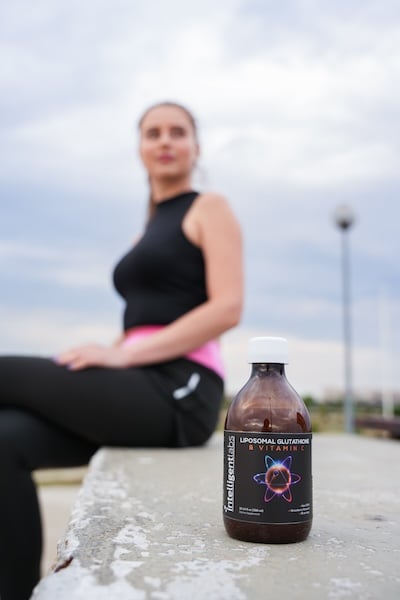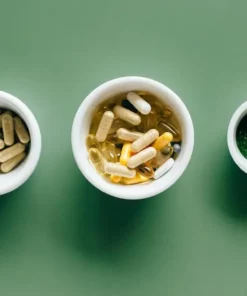Antioxidants
How To Increase Glutathione Naturally: Foods, Supplements, and More
Glutathione is a powerful antioxidant that helps protect your body from damage and keeps your immune system strong. However, factors like aging, stress, and poor diet can lower glutathione levels, making you vulnerable to sickness. The good news? You can increase glutathione naturally through the right foods, lifestyle habits, and supplements!
Table of Contents
Why Do We Need To Maintain Healthy Glutathione Levels?
Glutathione helps keep our cells healthy and functioning properly. It helps protect the body from harmful substances called free radicals, boosts the effectiveness of vitamins C and E, and supports the liver in detoxifying toxins so they can be safely removed from the body. 1
Low levels of glutathione are linked to many health issues, including neurodegenerative diseases like Alzheimer’s and Parkinson’s, lung diseases like COPD, and immune disorders. It’s also associated with age-related conditions like cataracts, liver disease, and a general decline in health as we get older. Research shows that higher glutathione levels are tied to better health and a longer life. 1
Can Your Body Make Its Own Glutathione?
Yes, your body can produce its own glutathione! It’s synthesized from three key amino acids: cysteine, glycine, and glutamine.
You can find these amino acids in a variety of foods like meat, fish, dairy, and fruits and vegetables—many of which are mentioned in the next section!
What Foods Help Boost Glutathione Levels?
If you’re wondering if you can eat your way to better glutathione levels, you absolutely can!
Glutathione is found in various fruits and vegetables, but it’s important to note that eating these foods may not always give you a direct dose of glutathione. Instead, they help your body produce glutathione naturally. 2
Some top foods include fruits like avocados (15.5 mg of glutathione per 100g), strawberries (11.6 mg per 100g), lemons (10.5 mg per 100g), and tomatoes (1.5 mg per 100g). 3
Brassica vegetables like broccoli, spinach, and cauliflower are also excellent sources. These sulfur-rich foods promote the production of glutathione in your cells, thanks to compounds like polyphenols. These compounds encourage your body to make more glutathione naturally, boosting your antioxidant levels. 2
Other good sources of glutathione or glutathione-promoting nutrients include green peppers, oranges, apples, bananas, garlic, and carrots. 2
When Should You Turn To Glutathione Supplements?
According to Dr. Vijayanand Pujari, our pharmaceutical scientist with over a decade of experience in supplement formulation, “You should consider glutathione supplements if you’re dealing with conditions related to its depletion or if you’re looking to support overall health and aging.”
So, how can you ensure you’re getting enough glutathione?

This is where our Liposomal Glutathione + Vitamin C supplement steps in to make things easier. Our advanced formula uses a liposomal delivery system for superior absorption, ensuring your body gets the most out of the 500 mg of glutathione and 1000 mg of vitamin C per 10 ml serving. It’s a powerful yet convenient way to optimize your glutathione levels, especially when life gets busy or your diet falls short.
Dr. Pujari explains the synergy between glutathione and vitamin C:
“Glutathione is the body’s primary antioxidant, and vitamin C plays a crucial role in recycling glutathione back to its active form, ensuring continuous availability. Together, they provide enhanced protection against oxidative stress, speed up recovery, reduce muscle fatigue, and improve resilience. This combination is particularly beneficial after exercise, helping protect cells and boost endurance.” 4 5
“Moreover, vitamin C helps maintain glutathione levels in the blood and boosts antioxidant capacity. 6 Additionally, studies have found that vitamin C increases glutathione concentrations in human lymphocytes, supporting immune function and overall health.” 7
Related article: Smart Picks: 7 Tips To Choose The Best Glutathione Supplement
What Other Nutrients Increase Your Glutathione Levels?
Certain nutrients also contribute to the body’s natural glutathione production.
Selenium, found in Brazil nuts, fish, and eggs, acts as a cofactor for the enzyme glutathione peroxidase, which helps protect cells from oxidative damage. 8 9
Curcumin, the active compound in turmeric, is another natural compound of importance to glutathione production. It supports your body by enhancing the activity of glutathione-related enzymes, helping increase your glutathione levels naturally. 10
Since regular curcumin can be hard for the body to absorb, a high-quality curcumin supplement ensures you’re getting enough to enjoy its full benefits. Not only does curcumin support glutathione production, but it also offers anti-inflammatory and antioxidant properties, making it a great addition to your daily routine.
Can A Healthy Lifestyle Boost Glutathione?
Yes! In addition to diet and supplements, certain lifestyle habits can naturally boost your glutathione levels.
Regular exercise is a proven way to increase your body’s production of antioxidants, including glutathione. Aerobic activities like jogging, swimming, or even brisk walking can help, as can strength training. The key is consistency; staying active keeps your glutathione levels steady over time. 11
Sleep is another important factor. During deep sleep, your body repairs itself and replenishes its antioxidant stores, including glutathione. Aiming for 7-9 hours of quality sleep each night allows your body to recover and recharge. 12
On top of that, reducing stress through mindfulness practices or relaxation techniques can help prevent oxidative stress, which lowers glutathione levels. Incorporating yoga, meditation, or even simple breathing exercises into your routine can make a big difference in maintaining higher glutathione levels. 13
With that said, it’s also important to know what could interfere with your glutathione-boosting efforts. Be sure to check out this list of things you need to avoid when taking glutathione to maximize its benefits.
Conclusion
Boosting your glutathione levels naturally is all about balance, including eating glutathione-rich foods, getting key nutrients, and living a healthy lifestyle. While diet plays a major role, liposomal glutathione supplements can offer the additional support your body needs. By following these simple steps, you’ll be on your way to maintaining healthy glutathione levels and keeping your body strong and resilient!
💬 Something on your mind? Share your thoughts in the comments. We love hearing from curious minds.
📩 And while you’re here, join our newsletter for more smart stuff (and secret perks)!
References:
- Pizzorno J. “Glutathione!” Integrative Medicine (Encinitas, Calif.), vol. 13, no. 1, 2014, pubmed.ncbi.nlm.nih.gov/26770075. ↩︎
- Al-Temimi, Anfal Alwan, et al. “Glutathione for Food and Health Applications with Emphasis on Extraction, Identification, and Quantification Methods: A Review.” Metabolites, vol. 13, no. 4, 24 Mar. 2023, p. 465, https://doi.org/10.3390/metabo13040465. ↩︎
- Thaipratum, Rutanachai. GLUTATHIONE LEVELS in the FIVE HEALTHY FRUITS for SKIN CARE. ↩︎
- Sastre, J et al. “Exhaustive physical exercise causes oxidation of glutathione status in blood: prevention by antioxidant administration.” The American journal of physiology vol. 263,5 Pt 2 (1992): R992-5. doi:10.1152/ajpregu.1992.263.5.R992 ↩︎
- Lee, Eunjoo et al. “Vitamin C and glutathione supplementation: a review of their additive effects on exercise performance.” Physical activity and nutrition vol. 27,3 (2023): 36-43. doi:10.20463/pan.2023.0027 ↩︎
- Johnston, C S, et al. “Vitamin c Elevates Red Blood Cell Glutathione in Healthy Adults.” The American Journal of Clinical Nutrition, vol. 58, no. 1, 1 July 1993, pp. 103–105, https://doi.org/10.1093/ajcn/58.1.103. ↩︎
- Lenton, Kevin J et al. “Vitamin C augments lymphocyte glutathione in subjects with ascorbate deficiency.” The American journal of clinical nutrition vol. 77,1 (2003): 189-95. doi:10.1093/ajcn/77.1.189 ↩︎
- Zoidis, Evangelos, et al. “Selenium-Dependent Antioxidant Enzymes: Actions and Properties of Selenoproteins.” Antioxidants, vol. 7, no. 5, 14 May 2018, p. 66, https://doi.org/10.3390/antiox7050066. ↩︎
- Hussein, Osamah, et al. “DIETARY SELENIUM INCREASES CELLULAR GLUTATHIONE PEROXIDASE ACTIVITY and REDUCES the ENHANCED SUSCEPTIBILITY to LIPID PEROXIDATION of PLASMA and LOW-DENSITY LIPOPROTEIN in KIDNEY TRANSPLANT RECIPIENTS.” Transplantation, vol. 63, no. 5, Mar. 1997, pp. 679–685, https://doi.org/10.1097/00007890-199703150-00012. ↩︎
- Abrahams, Shameemah, et al. “Antioxidant Effects of Curcumin in Models of Neurodegeneration, Aging, Oxidative and Nitrosative Stress: A Review.” Neuroscience, vol. 406, May 2019, pp. 1–21, https://doi.org/10.1016/j.neuroscience.2019.02.020. ↩︎
- Elokda, Ahmed S., and David H. Nielsen. “Effects of Exercise Training on the Glutathione Antioxidant System.” European Journal of Cardiovascular Prevention & Rehabilitation, vol. 14, no. 5, Oct. 2007, pp. 630–637, https://doi.org/10.1097/hjr.0b013e32828622d7. ↩︎
- Trivedi, Malav S., et al. “Short-Term Sleep Deprivation Leads to Decreased Systemic Redox Metabolites and Altered Epigenetic Status.” PLOS ONE, vol. 12, no. 7, 24 July 2017, p. e0181978, https://doi.org/10.1371/journal.pone.0181978. ↩︎
- Barros, Daniela, et al. “Mindfulness Meditation Training Effects on Quality of Life, Immune Function and Glutathione Metabolism in Service Healthy Female Teachers: A Randomized Pilot Clinical Trial.” Brain, Behavior, & Immunity – Health, vol. 18, 21 Oct. 2021, pp. 100372–100372, https://doi.org/10.1016/j.bbih.2021.100372. ↩︎





